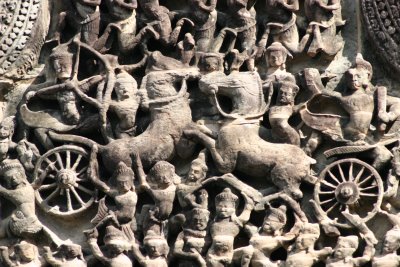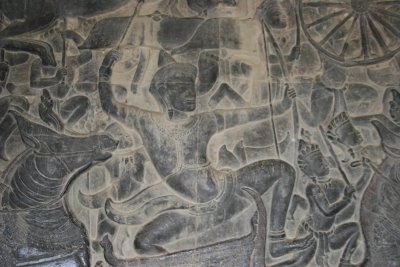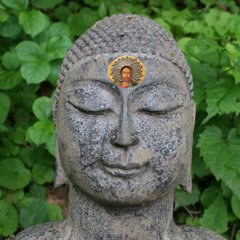I've just inadvertently created the longest hiatus on the blog since I began writing it. I just have too many projects open at one time.
Periodically we return to the question of struggle in real life, and what it means in comparison to the aims of the work, which are to grow a second being--body.
The two enterprises are not unrelated. The astral body cannot grow if we don't inhabit the organic body and counter all of the physiological and psychological struggles that it presents us with. You can't get a butterfly without a caterpillar. So all of the things that we encounter in ordinary life are absolutely necessary for our work. That's why we are here.
As Henri Trachol said, "You are born of your wish to be." We are incarnated in this flesh because of the need to grow. If there were other ways for the growth to take place, it would.
It's tempting to divorce the spirit from the flesh, and there is a separation. But in our existence, spirit and flesh are joined together. We need our real life, and we need every phenomenon, circumstance, and challenge that it presents.
Well then, my readers.
This summer, I came under fire from a senior member of the work who mistakenly thought that I equated the aims of Alcoholics Anonymous with the aims of the work.
Now, I don't get that reaction from every senior member of the work. Peggy Flinsch, on the occasions I have mentioned AA to her, expresses a heartfelt and enthusiastic support for the organization. She knows all too well how real it is, and how real the work that is done in it is. Her comment to me on the matter several years ago was, "More of the people in the Work could benefit from that organization." Not because they drink too much (although that weakness, along with the recreational use of drugs, is more prevalent than it ought to be) but because the kind of work that is done in AA has all of the elements missing in a lot of group work as it is conducted today at the Gurdjieff foundation.
Nakedness. Honesty. Trust. You get that in AA. How many of us can actually say that we dare to do that with our own groups? Go to a few AA meetings and discover how raw and honest they are. If we took all of the emotional clothing we wear off like that in the Gurdjieff work, we might get somewhere.
Why don't we do it? There is a very simple answer.
Fear.
I got browbeaten for bringing up AA. It wasn't pleasant. I struggled with--and am, as is evident, still struggling with--the reaction I got from this other senior member of the work, because he is a man who I respect (within the limited range that circumstances permit.) However, despite his seniority, his gravitas, and his many years in the work, there are some things he clearly doesn't understand, and the struggle with alcoholism is one of them. This is a man who knows how to drink, but he doesn't know how to not drink.
I know how to do both.
So what is the difference between Alcoholics Anonymous and the Gurdjieff work?
Alcoholics anonymous is filled with uncomfortably real, dirty, messy, traumatized people engaged in a life and death struggle. They know it's real, they know it's life and death, and they have to drop all their pretensions. They have already hit bottom. They have been beaten, pummeled, drugged, and destroyed by their own behavior until they see that they are nothing, and they have to claw their way back up out of the gutter.
The Gurdjieff work, on the other hand, is filled mostly with rather comfortable people leading rather comfortable lives who flatter themselves that they are on a higher level than others, and going places others can't go. They fantasize that they are engaged in some magical enterprise.
I suppose it's hateful to characterize it that way, because I have a deep love and respect for the Gurdjieff work and the people in it. Nonetheless, I see very few people in the Gurdjieff work who have really hit bottom. I have seen those people in AA-- in AA, the majority of people at the meetings have hit bottom.
There is a difference. You can't begin to understand yourself until you hit bottom. Not only do you need to hit bottom, but you have to bounce off it again and again until you are beaten senseless by the impact. I speak not from theories here, but from experience. Really beginning to understand yourself is hitting bottom over and over again throughout your life.
Working is hitting bottom. Imagination is thinking that we are special.
It is, in fact, that simple.
On a cosmological scale, we are smaller than bacteria. Insignificant little organisms scuttling about on the surface of a fairly small planet. We assign ourselves grand abilities and speak of ourselves and to each other as though we were important, but very little, if anything, that we do is of any significance whatsoever, even in relationship to this small planet itself. Some very few individuals such as Christ and the Buddha actually made a difference on this planet.
Most of us don't.
I think that when we measure ourselves against how small we are, and how big our egos think we are, we may have a chance to go up against our imagination about ourselves and actually do some work. But as long as we flatter ourselves with the idea that we know more than others, are more effective than others, more powerful, more attractive, more spiritual, or more of anything else, we are screwed. Well and truly screwed. Only if we realize that we are more egoistic than others do we have a chance of reaching towards a smidgen of the truth.
Well, enough of the sermon. I continue to look at those around me and the way they behave, and I question what we are doing in this work. Are we truly trying to become more ordinary, or do we want to be special? What are we going to drop the pretenses and realize that we have developed very little? When are we going to develop a connection with our organism that creates enough compassion in us to actually care for others, instead of just going through the motions?
We don't have long on this planet. Every moment of every day is a moment that is gone and will never come again. I was at my father's 80th birthday this weekend; he is an old man, and clearly doesn't have too much time left on this planet -- maybe another 10 or 20 years, if he is lucky. And the weekend before this, I went to see Betty Brown, my old group leader, who is 88 years old, and standing upright in her life like a lightning rod, despite a stroke and the loneliness of her retirement community where there are very few people interested in the work.
Encounters like this remind me that my life is passing. I don't have much time left either. For all I know, my time will be even briefer; any of us could die at any moment. How much of my attention do I turn to the events of today in order to work harder? I need to ask myself this.
This is one of the most difficult times of year to do that. A great deal of the energy that supports me during the year starts to become more dormant at this time. This is a planetary, or astral, phenomenon, not a failure on my part to be more connected. All of us in the northern hemisphere are affected by this at this time of year. We must do the best we can do under these more difficult circumstances, knowing -- as brother Lawrence knew when he saw the tree -- that the leaves will grow again in the spring.
I hope to become more active in posting here again. As I look back over the last two years, I see that this enterprise has not only provided a service for the work, it serves as something of a diary of my inner life. Perhaps few people would dare to expose such a diary; again, as I mentioned before, we don't really trust each other.
What do we need to do in order to begin to trust each other?
In ending, I will offer you a brief prayer I have been using in my sittings that seems to me to touch upon the questions of trust and faith.
"Heavenly Father,
I come before you naked and alone,
offering myself in service to your greater glory."
May your roots find water, and your leaves know sun.



















